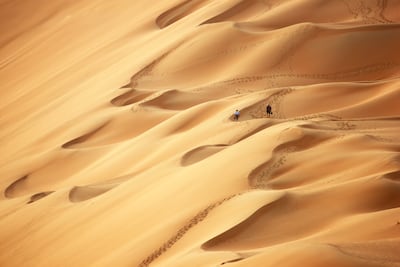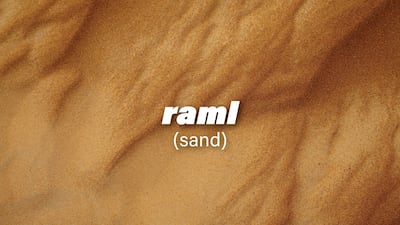The Arabic word for sand is rich with poetry, divinations and timeless advice.
Raml (sand) is made up of fine minerals (ma’aden). It is finer than gravel (hassa) and larger than silt (altamy or alghareen). In singular form, raml becomes ramla, whereas rimal is its plural derivative. The word sandy, meanwhile, translates as ramly. A grain of sand is habat raml.
There are several classifications of sands based on grain size, including: raml al na’em (fine sand); raml al mutawasset (medium sand) and raml al kheshn (coarse sand).
Kuthban ramliyya are dunes. A single dune is known as kathib.
When someone tumbles or becomes bogged down in the sands, literally or metaphorically, you could say ta’athara fil rimal. On the other hand, ramala could be used when a person rushes to accomplish a particular task, without much attention to detail.
Darb al raml is an antiquated custom of projecting the future, and assuming the unknown, by interpreting lines and shapes in the sand. The term was also the title of a trilogy by Saudi novelist Muhammad Al Muzaini that followed the transformations in Saudi society in the second half of the 20th century. The novels were adapted into a television series in 2020.

Raml al demagh, or brain sand, refers to the calcified forms in the pineal gland.
Rimal al mutaharrika is quicksand. Sa’at al raml is an hourglass. Hajar ramli is sandstone. Raml al shu’ab al marjaniyya are coral sands.
Mala’ab raml, meanwhile, refers to a sandy playground. Qal’at raml is a sandcastle and rimal al shaate’a is the sand on a beach, which is also known as rimal almaghsula (washed sands) or rimal fiddiyya (silver sands). On that same note, the Arabian Gulf is known for its golden sands, or rimal dhahabiyya.
Raml is also one of 16 buhoor alshe'er (literally, the seas of poetry), which is a term used to classify a group of iambic meters. Al Khalil ibn Ahmad Al Farahidi, an eighth-century philologist and grammarian known as the Genius of Arabic Language, is credited as the developer of the classification. Besides his work in developing the study of prosody and poetic meter, Al Farahidi was also the scholar who penned the first dictionary of the Arabic language and introduced the harakat system.
Finally, an old proverb that beckons the sands for sound advice: Iaa’al khatawatuka fil khair kaman yamshi a’la al rimal, la yusma’ sawtuhu walaakin atharahu waadeh.
Perform your good deeds like footsteps in the sand, inaudible but with clear traces.











































































